This is it! You are starting on an exciting journey toward success!
You have already put mountains of time and energy into your startup.
Now it’s time to find someone—or several ‘someones’—who can convert your dream into reality.
Where and how to find a programmer for your startup?
Find out how successful startups find programmers. They will guide you to your best decision.
1
What Top Tips Help You Find Programmers for Your Startup?
When trying to find programmers for your startup, be sure you have a plan. This is challenging. Apart from programming skills, the team must possess extraordinary soft skills to ensure smooth communication and project management.
Consider the following tips:
Open, clear communication
- You clarify your aims, priorities, and requirements.
- They explain precisely how and when they will deliver your project.
Nothing less. Nothing more – сlarity is key to success.
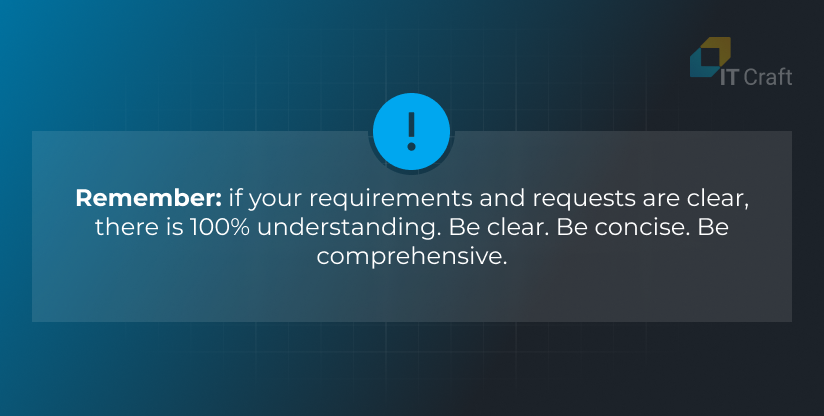
Cultural fit eliminates miscommunication.
A team must correctly understand your goals, views, and values—both written and cultural. The team shares a strong work ethic delivering its promises to clients. All team members—clients and their representatives are a part of the team—are treated equally and receive the same, top services.
Be on the same page regarding the project plan and delivery
You have two approaches to product development.
- 1. Fixed
- After you and the development team agree on price and delivery based on your requirements, nothing changes: budget, timeline, requirements, pricing. Fixed and final.
- Launch on time and within budget.
- 2. Flexible
- Freedom and flexibility to change your mind and pivot throughout your project. You will need an Agile team able to pivot and adjust to a changing software development plan.
- Every time you pivot, the project plan, budget, and timeline shift into the future.
Experienced teams avoid pitfalls
When a team has already launched startup projects, they:
- know where issues tend to occur and pitfalls to avoid
- find the best solution for planned functionality
- offer a technological stack for lower maintenance costs
- offer a technological stack for lower maintenance costs
Teamwork-first approach ensures sustainable progress
Software development for startups is a complex process.
- 1. On developer’s side:
- Professionals with different specializations are involved in a project. The team enjoys a harmonized workflow.
- Team members share progress on the project and transfer knowledge with each other.
- 2. On your side:
- You need someone to manage the project. If you haven’t the time, assign a dedicated project manager to oversee the project. For successful project delivery, you must make decisions and replies to developers in a timely manner. No exceptions.
Use these tips to find programmers for a startup and ensure workflow for a successful project launch.
2
How to Find Programmers in Six Simple Steps
Searching for a reliable team can be daunting. It includes a myriad of specific details you must consider.
We have prepared a six-step workflow to simplify your routine, from initial search to final selection. Each step contains all essential activities.
Save time. Find programmers for your startup that match your expectations from software development.
STEP 1. LOOK FOR THE RIGHT OPTION FOR YOU: IN-HOUSE VS. OUTSOURCING SOFTWARE DEVELOPMENT
When looking for programmers, take your time. Ensure you choose the right strategy. There are pros and cons in each of these options:
- in-house team
- freelancers
- outsourcing company
In-house development
You hire the required engineers and onboard them into your team. Engineers work on your project on site or remotely.
An in-house team is a great fit for a long-term strategy. But you need all the resources to cover benefits and perks, equipment, licenses, and more. You need to rent an office and make it comfortable.
Add time for hiring, building, and adjusting your team. Be prepared that team members might quit, and you will need to start over. Each replacement costs you time and a higher salary.
As a result, you also need specialists capable of recruiting, onboarding, and retaining your valuable cadre so that you evade the situation when the key specialist resigns in a critical moment.
- Pros:
- No delays in updates. When a programmer sits next to you, you discuss the issues face-to-face. You update your project immediately. No delays.
- Control over processes. You keep tech and business knowledge in-house, being a part of planning and documenting processes.
- No vendor dependence. You avoid such factors as quality decrease, supplier instability, or sudden price increase.
- An in-house team provides a predictable outcome.Startups can plan long-term expenses.
- Cons:
- The price.Software engineers have high salaries. Plus, you must pay the insurance and social taxes. “Nothing to sneeze at.” Without funding from incubator an incubator, money might quickly be in short supply—perhaps even before you release an MVP.
- Hiring costs.The cost of hiring an on-site programmer is high.
- Long hiring timeline.It may become an issue under a tight deadline.
- Limited talent pool.When relying on the local job market, you might not fill an open position. It might be easier when expanding your geographical circle. Still, finding the right talent within the right location is hard due to talent shortage.
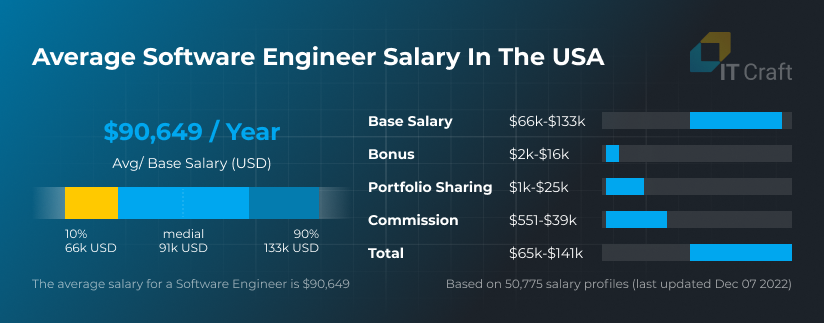 Source: https://www.payscale.com/research/US/Job=Software_Engineer/Salary
Source: https://www.payscale.com/research/US/Job=Software_Engineer/Salary
Freelancers
In this case, you sign up in a marketplace where you look for professionals matching your desired skills and experience. You avoid overhead costs by hiring freelancers. Also, you decrease direct costs by hiring engineers from cost-effective locations.
Still, risks are high when you have little experience. Each freelancer has their specialization. You basically “assemble” a team by giving each freelancer specific tasks. Therefore, you must be very specific about your needs.
Also, double-check every offer. Ensure you work with a reliable person that completes the job when promised.
- Pros:
- Development costs. It is possible to save a substantial part of your budget and get top quality. Still, you must be realistic. Top talents are expensive everywhere.
- Flexibility. You can hire a freelancer on a long-term basis. But you can also assign freelancers for specific, short-term jobs, required for solving newly emerged, unexpected challenges.
- Faster deliverables. Freelancers are interested in completing the assigned job fast and getting to the next project. Or enjoying free time. Overall, they focus on effectiveness.
- Cons:
- Delays. The biggest risk of freelancing is that freelancers are hard to replace. An individual can get sick or take a long vacation leaving you with an incomplete task.
- Workflow. Remember to include indirect costs. You will spend time managing and coordinating your freelancers. Working from different time zones adds complexity to the issue.
- Guarantees. This is the disadvantage of faster deliverables. Freelancers are interested in finding new gigs rather than improving completed tasks. They may disappear or stop answering your emails unless guarantees are stated in the contract.
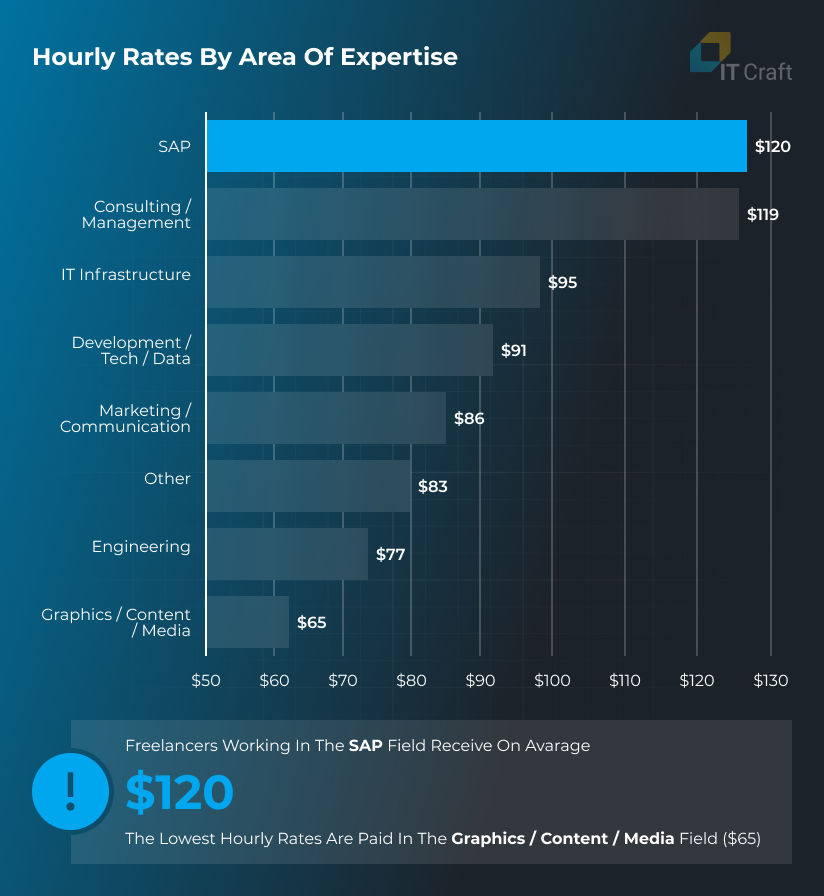 Source: https://www.freelancermap.com/market-study
Source: https://www.freelancermap.com/market-study
Outsourcing company
Turning to an outsourcing company provides a balance between an in-house team and freelancers. An outsourcing company finds the needed talents for your project and manages them. It also offers project management and team coordination.
Similar to freelancers, outsourcing companies provide competitive hourly rates.
Just like an in-house team, a dedicated outsourcing team becomes a part of your project, working exclusively on your tasks while you spend minimum time on alignment.
- Pros:
- Competitive pricing.Cost-saving hourly rates are possible. You pay neither taxes nor insurance. Overhead costs are also the responsibility of an outsourcing provider.
- Established workflow.Outsourcing companies provide experienced, stable team squads. Team members know their roles and the scope of work they need to deliver on a project.
- Access to specific expertise. The company provides you with particular expertise, which is rare on the market, but you do not need it full-time, e.g., DevOps.
- Cons:
- Communication.You need to adjust your schedule when the outsourcing provider resides overseas. Also, take your time on clarifications and check-ins.
- Cultural (mis)fit.Carefully weigh a provider. Risks of picking the wrong provider vary from a delayed project to cost overruns and low quality. Look for a reputable provider sharing similar background and working culture.
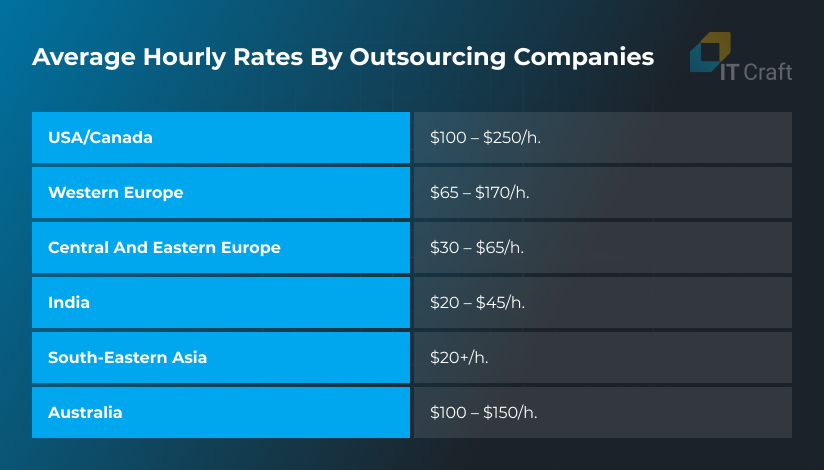 Source: https://itechcraft.com/blog/how-much-does-it-cost-to-develop-mobile-application/
Source: https://itechcraft.com/blog/how-much-does-it-cost-to-develop-mobile-application/
To avoid extra expense, ensure you choose a software development team with a competent and engaged project manager. Choose a team in a location with a suitable time zone where you can find programmers for startups. (Yes, this is when Eastern European companies provide a favorable balance between costs and quality.)
STEP 2. MAKE AN ACTION PLAN
As a startup, you must be aware of your requirements and expectations. The future team must address them.
Think of your priorities. Decide on important aspects:
- source code quality
- development price
- project deadline
- secure workflow
- flexibility in changing requirements
- instant communication
Apart from setting your priorities, make a list of project requirements. For best, long-term results, you will discuss them with software developers.
- Write down a list of your exact requirements.
- Prioritize your requirements.
- Based on your list—and your desired timeline—decide if you need a single developer or a team.
- If you choose a single programmer, remember a single developer cannot do everything. Too often, sole developers do not realize what they don’t know or cannot do well. Plus, you might end up spending a lot of money while the developer tries to solve an unanticipated pitfall (pitfall to him, not to an experienced team).
- Herein lies the main advantage of choosing a team. A team follows a well-adjusted process from project start to launch.
STEP 3. WRITE A LIST OF POTENTIAL CANDIDATES
Once you have decided on either building an in-house team, finding freelancers, or a company depending on your action plan and budget limits, ensure you have a list of requirements.
It is time for preliminary research. Look for those candidates that fit in with your expectations from the best value for the offered price.
It may be tricky when you have no tech background, yet possible:
- Go through 2 – 3 marketplaces to make your own impression of the market state and available options. (Check below Where do you find programmers for a project?). Study websites providing verified reviews!
- Decide on your “shoring” (onshoring, offshoring, or nearshoring) and related compromises. For instance, Indian and Asian companies offer low prices. However, you should keep cultural barriers in mind. Without relevant managerial experience, software development might soon turn into a disaster. Latin American countries share same or similar time zones with North America. Their fees tend to be high. Eastern European countries offer a great quality-for-the-price ratio.
- Decide on the sections where you will look for developers—marketplaces provide many options. Discover available offers in those sections. Evaluate provided rankings on your own.
! Check this out: how to find a programmer for a startup via Clutch.
Meanwhile:
1. Work on a list of interview questions (see tips below).
2. Prepare a document that contains a list of requirements from Step 2, the same for all candidates.
3. Make a checklist. Write down your impressions of the candidates (or download ours below).
STEP 4. WRITE DOWN THE TOP TEN ON YOUR LIST
Now when you have selected one or several categories on a trusted website, you determine ten candidates you think will be good for you and your project.
Whether choosing a team or an individual programmer, the process is the same:
- Look through software developers’ websites.
Study profiles on social networks. Ensure the company/professional has the required tech focus and enough expertise to handle your project.
This information is available on trusted marketplaces such as Clutch or Upwork. Check whether the chosen destination aligns with the expected budget. Look how well the team fits in with the price range, which is common in their respective region.
You need a decent quality-for-the-price balance.
- Check out each team’s portfolio.
Read testimonials and reviews from verified clients. Watch video testimonials, when available.
No testimonials? It might be a sign to keep searching further.
- Select 10 – the most experienced top 10.
Take serious note of the developing teams’ projects. Ensure their projects are like yours. The team can then handle your requirements more effectively.
Examine project range, complexity, and challenges. Explore timeline and deliverables.
- Ask them to send references.
Talk to their clients if you like what you see but still have doubts. Ask the team to provide references. Discuss the following with the references:
- team performance on the project
- team’s strong and weak sides
- points to consider
STEP 5. SHORTLIST THE FINAL FIVE
Narrow down selected candidates to a short list of five best-suited ones.
Pick up your top five from your list. Send your requirements and schedule an interview:
- Arrange a video call with each team or professional.
Look who is present on the call. The rule of thumb is that a project manager or a lead developer responsible for your project participates in the call. As well as a sales or account manager.
Make sure you interview the person with whom you are going to work.
- Go through your list of questions.
Use the same questions for everyone to be able to compare responses from different teams. This helps you find the best fit.
Check the section below for tips on interview preparation.
- Write down each team’s answer.
Make notes during the call. You will need them for further evaluation.
A good sign is when a team sends you a follow-up letter summarizing the call details.
- Ask the programmers about their experience.
Be specific about what you need for your project. Ask the programmers about a couple of challenges they encountered and the solutions they implemented on a similar project. Only developers with many years of experience can help you realize your goal without wasting time and your money.
- Ask each team what they would recommend moving forward.
Be prepared to answer clarifying questions the team might ask. If the team poses no questions, they might have no clue what challenges they might encounter.
Next, what is their proposed plan? If silence is their only answer, they lack experience. Cross them off your list. Move on to the next team.
Therefore, choose a team that:
- listens to what you say about your idea
- asks relevant questions
- tries to understand exactly what you want to present to the world
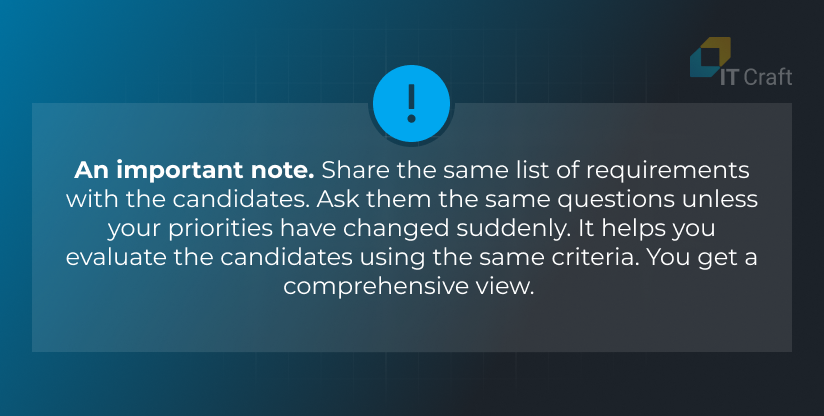
STEP 6. LOOK FOR YOUR TEAM/PERSON
Three criteria: trustworthy, capable, and experienced. Add good communicators and listeners. They increase your chances for success. Find a professional team who knows how to write high-quality code and respects the importance of a good working relationship—a relationship based on trust.
A word of caution: Avoid choosing the cheapest software outsourcing company. In your endeavor to save money, you might lose your money. Cultural differences and fly-by-night companies might turn your dream into a nightmare. Avoid some lower-price-range developing teams who might say, “Yes, of course, we can do that!” just to get your business.
The other signs of hidden costs in project estimates include:
- Generalized estimates – The project manager provides few details about the project price, leaving the door open to demand extra charges on non-development activities such as project management, testing, BA, or deployment, adding 15% – 25% to the total project costs.
- Sudden changes – Does a new project manager appear, although no one warned you in advance or gave you a reason why the first project manager has ‘disappeared’? The same could happen to lead engineers, resulting in decreased quality and increased timeline.
- Low estimates – The team’s estimate is 2 – 3 lower than other teams’ estimates? Ask for verifiable reasons for an optimistic estimate. Better yet, look for a different team.
And consider this: if a company gives you a low estimate, perhaps it deems your project a low priority. This could mean your project will receive less attention to be on time and successful.
3
Where Do You Find Programmers for a Project?
The question keeps every new startup awake at night:
Where should I look for reliable specialist(s)?
There are a few ways to find the programmer(s) you need.
The first option, you can ask your friends and colleagues for references. They might have successfully worked with a freelance engineer or an outsourcing company. If they have, they could share contact details and help with advice.
But it is also possible they have had a less-than-perfect experience and might not be able to refer anyone.
Then, the second option applies. You find a service provider on your own using a specialized platform.
Below we have collected several platforms where you can find programmers to hire:
An extensive professional network provides access to talents from almost any location. Established outsourcing companies, small agencies, and freelance engineers have their profiles here. You can use LinkedIn to get more information about a company or person. Check their professional background and recent activities; reach out to them if you have a question.
A global online platform where businesses and startups can connect remotely. You can find here both individual professionals and full-cycle agencies. Upwork has a blog with tips and tricks on how to find programmers and other freelance workers. The benefit of using Upwork is risk-free deals. Still, commissions apply for each transaction at both ends, which might add to total project costs.
- Wellfound (f.k.a. AngelList Talent)
Another platform where freelancers, startups, and investors meet each other. It has a different philosophy than Upwork’s. Wellfound: is oriented specifically toward startups. It simplifies job posting, HR, and recruiting, thus, connecting future employers with top talents motivated to work with a startup.
In turn, engineers find remote and freelance jobs on the website.
A digital destination to inspire creative minds. The site features the best designs by industry, spotlight interviews with top designers, trends, events & top lists of global and marketing agencies and technology companies. You also find contact details of a company you like.
The place to go if you are looking for a team. Because Clutch has a dedicated manager for every company listed, everything is professionally tracked and verified. This is incredibly important for prospective clients. Before any testimonial is posted on behalf of a service provider, Clutch contacts the client and verifies the statement’s authenticity.
Clutch’s main opponent, Goodfirms, provides rankings based on reviews from a company’s former and current clients, the company’s portfolio, and its tech focus. Website visitors can search through many categories to find the best fit. They can read short reviews and see ratings. Also, video testimonials are available.
Visitors enjoy a large knowledge base aimed at informed decisions.
4
How to Find a Programmer for Your Startup: Interview Tips
As already mentioned above, interviewing is crucial. There is a risk of meeting a dishonest and/or unqualified provider. Interviewing helps you filter irrelevant and dubious offers.
Examine these four essential parameters during an interview.
Each of them is vital for a timely, successful launch:
- Communication
- Cultural fit
- Proven experience
- Technical skills
Communication and cultural fit belong to soft skills. Check whether the candidate understands you and your goals and shares a similar working culture.
Experience and technical skills are hard skills. You ensure the candidate possesses enough knowledge and expertise to manage your project effectively.
Focus on how to find a programmer for your startup that matches best all four criteria.
The team must accurately decode provided information. It needs to keep the bigger project picture in mind to handle your requirements effectively.
Therefore, talk to the professional or company representatives to determine language skills and level of commitment.
If the candidate has difficulty understanding you, you will lose considerable time explaining every small detail.
If the company or the candidate delays over an initial response, the same might happen during project implementation.
You need a professional/team with a high working culture.
Study candidates’ reactions to your project: Do they have project-related questions? Are they careful about promises related to project estimates?
You need a team with a proactive, yet realistic, attitude. Then, engineers suggest the best path to your goal. You will be in trouble if they have no interest other than signing a contract.
Check team composition and routine. Ask how they handle encountered challenges. Projects often have unexpected challenges.
Ensure the candidate is transparent and will keep the promises.
Do doubts emerge? Contact references.
Discuss the candidate’s experience during the interview. Ask them about launched projects: What did they do? How did they communicate with the client? Did they communicate with another team? How did they manage to launch on time?
It gives you an understanding of the candidate’s strengths without diving deeply into technology. It also helps you determine whether the candidate has the required experience.
Assessing tech skills is easier with an engineering background. The best option is engaging a technical co-founder.
Still, you can do it on your own by asking basic questions. Ask to explain how the candidate is going to address your project concerns.
Listen to the answer. The candidates should care about explaining complex technical terms clearly using uncomplicated words. They also should provide a roadmap.
Does the candidate offer a different path than you imagine, e.g., a React Native app instead of a native app? It is possible. Yet, there must be sound reasoning.
It is wise to start cooperation with a small pilot task. You see how the chosen candidate handles your requirements. When the task is complete, you evaluate its result and decide whether you move forward or turn to another name from your list.
Not sure about source code quality? Ask a trusted person for a short check or order a third-party project audit.
5
How Do Startups Increase Their Bottom Line When They Find Programmers for Their Project?
Specifically, an experienced team significantly decreases time to market. The sooner to market, the more quickly a startup starts earning money.
An experienced development team frees you from all the hassles related to design, development, and launching software. Turn your back on worry and hassle. Focus on the business side of your startup.
When hiring an experienced development team, you get the following benefits:
- Correct and direct laser focus
An experienced development team handles the technical side of the project.
You direct your efforts on marketing and promotional activities.
You focus on understanding what your audience wants and get help with how it gets delivered.
You keep pace with business development.
- No need for micromanagement
You:
- Benefit from an established workflow when hiring a dedicated team.
- Work with a project manager and a business development manager—your contact points between you and the engineers.
- Save time clarifying minute details. They know more than you.
- Stay current with project progress.
- Focus on the bigger business picture.
- Decreased delivery timeline
You benefit from a harmonized collective effort: the development team works simultaneously on different parts of your software. It is possible using the Agile approach. Other automation techniques also apply, e.g., DevOps and test automation.
The development team keeps pace with tight deadlines while delivering high-quality source code.
- Lower overall development and maintenance costs
With reliable, experienced programmers more becomes less. There is simple math: an expert-level team has higher productivity. It means less time spent arriving at the launch date. Hence, the total cost of development is lower. A reliable team develops software for startups keeping probable future changes in mind. You get a solution that can be extended and/or scaled easily.
6
What Makes IT Craft the Right Place to Find Programmers for a Startup?
IT Craft provides a wide range of technical services for startups needed to launch a product as soon as possible.
This includes:
- technical consulting
- rapid prototyping
- MVP development
- full-cycle, full-fledged app development
- project rescue
- technology migration
- team augmentation
- product pivot…
…and more.
IT Craft makes resource-saving development possible. How?
Established top-level software development services.
You benefit both directly and indirectly from:
IT Craft software developers have written high-quality code for decades of successful startup launches. They know how to handle startup projects ensuring a balance between software development price, timeline, and quality of produced source code. The source code is maintainable and well-commented.
An experienced development team shares its in-depth experience with the product owner and gives sound advice on the best implementation path. They know pitfalls and do their best to avoid them, ensuring the startup project is safe. Moreover, developers constantly test new technologies broadening their knowledge. They know what is best in a certain project situation. They will offer their expert advice to the product owner.
Staying in touch is easy. The project manager and business development manager are always available during business hours. They quickly respond to any and all project-related questions.
The team adjusts communication practices according to the client’s convenience. Both weekly and daily meetings are possible. Any means of communication can be incorporated (messengers, project management software, email, etc.).
Many IT Craft software developers have worked at the company for five+ years. This ensures a stable workflow within the teams. Different practices help with constant knowledge transfer on a project.
Any time the team needs different expertise on a project, they get immediate help from one of IT Craft’s many departments.
It is important for every startup to begin software development soon.
With IT Craft, this is simple:
1.A potential client sends a project request.
2.IT Craft developers provide an estimate.
3.Both parties negotiate the details.
4.When the parties agree, the contract is signed.
5.The development team starts working intensively to meet the agreed deadline.
6.Launch product.
- Post-launch guarantee period
Once startup software is launched, a post-release guarantee period starts. The development team stays in contact with the product owner, ensuring the software works and end users are happy with the technical quality of the solution. All bugs and flaws discovered in the source code are eliminated at no cost to the startup during the guarantee period. The team responds fast.
Therefore, if you need to know…
- how to build a development process
- what technology to use
- what solutions are optimal to ensure the best results…

 Source: https://www.payscale.com/research/US/Job=Software_Engineer/Salary
Source: https://www.payscale.com/research/US/Job=Software_Engineer/Salary
 Source: https://www.freelancermap.com/market-study
Source: https://www.freelancermap.com/market-study
 Source: https://itechcraft.com/blog/how-much-does-it-cost-to-develop-mobile-application/
Source: https://itechcraft.com/blog/how-much-does-it-cost-to-develop-mobile-application/



